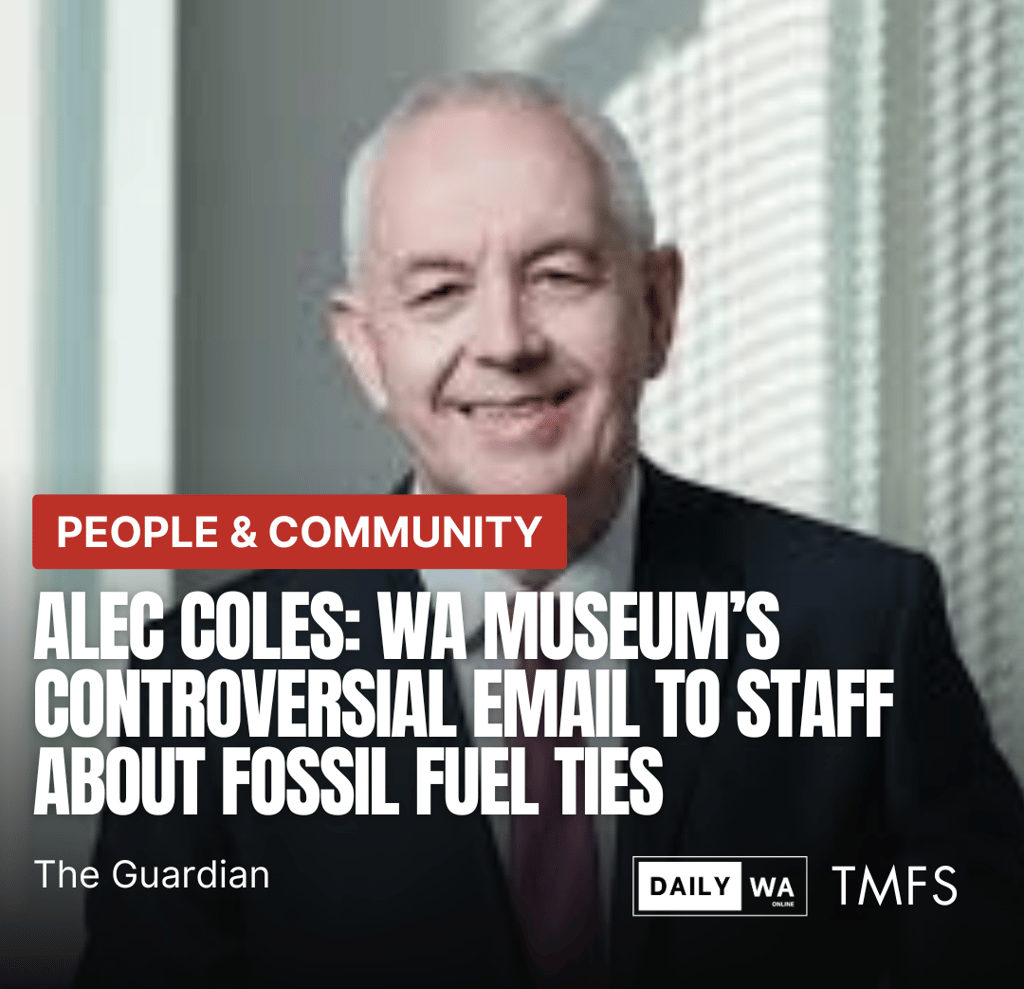Fossil Fuels and Cultural Institutions: What the WA Museum Debate Reveals About Trust
The backlash over WA Museum’s internal email on fossil fuel sponsorship highlights the growing tension between cultural integrity, community trust, and corporate influence.
PEOPLE & COMMUNITY


Institutions are built not only on collections and exhibitions but on trust. When that trust is tested, the ripple effects can reach far beyond the walls of a museum. The recent controversy surrounding WA Museum’s internal email about fossil fuel sponsorship is a moment that underscores this delicate balance. It is a reminder of the profound responsibility cultural institutions carry as stewards of both heritage and public confidence.
The email, which addressed staff concerns over corporate ties, has reignited a debate that extends far beyond Western Australia. At its core, the question is whether partnerships with fossil fuel companies align with the mission of institutions dedicated to education, culture, and community engagement. While sponsorships provide financial stability, they also raise difficult questions about perception and integrity. When staff express unease, it is not simply about contracts or funding. It is about whether the values projected outward are consistent with the values held within.
Across the world, this conversation is gaining urgency. From London’s Science Museum to New York’s Metropolitan Museum of Art, cultural institutions have faced scrutiny for their reliance on fossil fuel sponsorships. Critics argue that such partnerships risk compromising credibility, particularly at a time when climate change is not a distant concept but a lived reality. Museums are not just custodians of history. They are also platforms that shape public understanding of the future. For many, accepting fossil fuel sponsorships feels incompatible with that responsibility.
There are, of course, counterarguments. Sponsorships provide resources that enable free access programs, traveling exhibitions, and vital research. Without them, institutions may struggle to reach communities or preserve collections. Yet the strength of this argument is weakening as alternative funding models emerge. Philanthropy, government support, and new public-private partnerships are increasingly being explored to reduce dependency on industries that spark public distrust. The question is no longer whether fossil fuel sponsorships sustain institutions. The question is whether they diminish the very authority those institutions rely upon.
For WA Museum, the stakes are particularly high. As a public institution, it represents not only the state’s cultural heritage but also its values. When staff voice concerns, they are echoing the broader community that looks to the museum as a trusted source of knowledge. This moment is not simply about one email. It is about whether leadership listens, adapts, and recognizes that credibility cannot be purchased. It must be earned and protected.
Examples from other institutions show the consequences of ignoring these debates. When the British Museum persisted in its partnership with BP despite widespread criticism, the resulting protests overshadowed exhibitions and damaged its public image. By contrast, when the Royal Shakespeare Company ended its sponsorship with BP, it was celebrated as a bold statement of alignment with the values of its audience. Both decisions carried financial implications, but only one strengthened trust.
The deeper lesson is that cultural institutions hold a unique kind of influence. They do not simply tell stories of the past. They shape conversations about the present and future. When their actions contradict the very issues they invite the public to explore, they risk eroding the authority that makes them essential.
For Western Australia, the WA Museum’s sponsorship controversy should be seen as an opportunity rather than a crisis. It is a chance to lead in redefining how cultural institutions can thrive while remaining true to their mission. By addressing concerns openly and considering new funding strategies, the museum can strengthen both its integrity and its relationship with the community it serves.
At TMFS, we believe leadership is tested most clearly in moments of scrutiny. The question is never only about what is financially possible. It is about what is morally consistent and strategically sustainable. Cultural trust, once lost, is difficult to rebuild. Protecting it requires foresight, courage, and a willingness to adapt.
The takeaway is simple but profound. A museum is more than its walls and exhibits. It is a mirror of community values. When financial necessity collides with cultural responsibility, the choice made reveals not only priorities but character. For WA Museum, this moment is about choosing the path that will keep trust intact for generations to come.
All rights belong to their respective owners. This article contains references and insights based on publicly available information and sources. We do not claim ownership over any third-party content mentioned.


